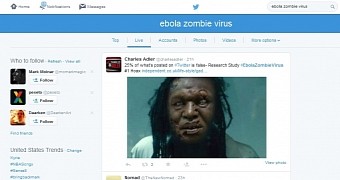A research carried out by the Georgia Institute of Technology, presented at a conference in Oxford last week, highlighted that almost a quarter of all messages on Twitter are believed to be untrue or containing false or inaccurate information.
The university's research staff parsed over 1% of all messages shared on Twitter for over 96 days, compiling the results in the CREDBANK database.
In the end, over 60 million tweets were recorded during the initial feed scraping period, and the analysis followed over 1000 current events to document messages that could later be fact-checked.
Humans and computers worked together to produce the final results
This happened in the next phase of the research when the tweets were analyzed by a computer software and categorized based on areas of interest while also separating obvious spam.
The categorized data was then sent to actual humans via Mechanical Turk, a crowd-sourcing site where people manually analyzed tweets, fact-checking and verifying their proper category placement.
When the final results were tallied, one in four tweets seemed to provide either outright false information or small inaccuracies.
Apparently, lots of people were fooled by the Ebola Zombie Virus hoax
According to the CREDBANK database, last year's biggest hoax was the Ebola Zombie Virus trend that was warning people of Ebola dead rising from their graves.
Apparently, millions of tweets were sent out on this topic, but we don't think the university's staff was able to detect sarcasm or mocking intentions in those messages, because we doubt that wasn't the case in a large portion of times.
"Nowadays propagation and verification operate at a different timescale. Understanding the dynamics of rumors and falsehood will help us reduce this gap by building tools that speed up verification," says Iyad Rahwan of the MIT Media Lab, via New Scientist.
The CREDBANK database will be open sourced and made available to the public and developers, so applications and services can be built that can analyze and detect inaccurate information in real-time.

 14 DAY TRIAL //
14 DAY TRIAL //